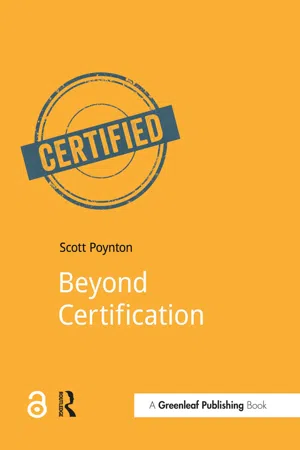
- 76 pages
- English
- ePUB (mobile friendly)
- Available on iOS & Android
Beyond Certification
About this book
This book is free to download in PDF and EPub formats.
Is certification the solution? Can it deliver urgently needed improvements to complex problems like deforestation and the exploitation of people? In this controversial new book, Scott Poynton, founder of The Forest Trust, makes a compelling case for a new approach to social and environmental problems that goes "beyond certification".Certification emerged from the 1992 Rio Earth Summit amidst great hope. Since then, despite a proliferation of certification schemes in twenty-five industry sectors, the destructive and irresponsible exploitation of natural and human resources has grown still worse.
Beyond Certification reviews the positive aspects of certification, of which there are many, but argues that we can no longer afford to gloss over its failures.
The book offers an alternative model, VT-TV, based on Values, Transparency, Transformation and Verification, which the author has been exploring and implementing with over 70 companies and industries around the world.
These companies are transforming the story of the raw materials they use – wood, palm oil, pulp and paper, stone, charcoal, soy, beef, sugar, dairy, rubber, coffee, cocoa and coconut. Mining companies are also exploring this approach, making decisions aligned with fundamental values and what they know to be right.The results? Trust is emerging as former combatants awake to the importance of working together.
Guns have been removed from forests, land set aside for protection, worker rights and conditions improved and long-standing conflicts have been resolved as people confront their legacies.
Beyond Certification does not claim that this VT-TV model is the only solution. Rather, it shows how new and seemingly radical thinking can catalyze positive change. Included: the limits of roundtable certification illustrated with real, practical examples; the intricacies of the change process – how companies move from destructive to more responsible practices; how to implement more holistic, economically effective, durable systems to better protect people and the environment.
Tools to learn more effectively

Saving Books

Keyword Search

Annotating Text

Listen to it instead
Information
Chapter 1
Introduction
And what is not good –
Need we ask anyone to tell us these things?”
Chapter 2
Certification’s Record
Table of contents
- Cover
- Title
- Copyright
- Abstract
- About the Author
- Acknowledgments
- Contents
- Preface
- 1 Introduction
- 2 Certification’s Record
- 3 Moving Beyond Certification
- 4 Between Two Worlds
- 5 Setting Spirits Free
- References
- Notes
Frequently asked questions
- Essential is ideal for learners and professionals who enjoy exploring a wide range of subjects. Access the Essential Library with 800,000+ trusted titles and best-sellers across business, personal growth, and the humanities. Includes unlimited reading time and Standard Read Aloud voice.
- Complete: Perfect for advanced learners and researchers needing full, unrestricted access. Unlock 1.4M+ books across hundreds of subjects, including academic and specialized titles. The Complete Plan also includes advanced features like Premium Read Aloud and Research Assistant.
Please note we cannot support devices running on iOS 13 and Android 7 or earlier. Learn more about using the app